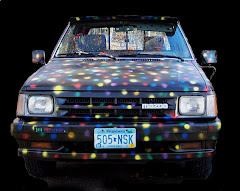Not sure what you think about water - if it's just clean or dirty or swampy or toxic. But there's some fascinating information on the effects of thought on water at http://www.life-enthusiast.com/twilight/research_emoto.htm and research that's been done. Great pictures, too, on this site, though it does come from a product-selling site.
The intrigue of it lends to further pondering; we are composed of a lot of water, so what do our thoughts do to ourselves? If we thought water was just a mix of H's and O's - i.e. 'non-responsive, nonliving' substance, and yet we can see changes in the structuring of it "by thought" ... what other 'solid facts' are open to rewriting?
I loved the movie Now What The Bleep Do We Know? because it questions much of our assumptions. I would take it a step further - then why do we empathetically declare machines and rocks and land itself are outside these influences, instead of allowing there may be more than we know, yet to discover?
I would, wouldn't I? :)
And I'll add, if Einstein is right about time and space being relative, then where is the central point of it all? Wouldn't it be like Grand Central Station, where things (people, even?) could flow in and out? At least thoughts, hmm?
Seems 'my Bleep' is pretty big in 'my world'. And does seem I do better when I go with the flow of it, instead of "sinking to more mundane world views that dismiss it" - it does no harm when I thank the washing machine for continuing to perform; it also gives me a sense of gratitude. Which I should have, and is where this post started "on water".
Don't just drink it, think it?
Subscribe to:
Post Comments (Atom)

I started looking at the site, but could no longer suspend my disbelief when the claim was made that different words on paper taped to the vessels that the water was frozen in produced different results. Water is pretty neat stuff though, it is the only liquid that contracts as cooled (as all liquids do) but then expands upon solidification. It can also go directly from a solid to a gas at temperatures lower than its boiling point, a process called sublimation. Contrary to popular belief, a few years ago researchers in Antartica found two snowflakes that were identical. Great minds throughout the ages have had deep insights into water, such as W. C. Fields, who said "I never touch the stuff."
ReplyDeleteJim, I'd assume it'd depend on the intent when the words were written - as such, I don't think water 'reads' words! ... I don't think it needs to. Any dog in the world - barring deaf ones - understands 'tone' no matter what language. There's an equal chance the papers could have been blank with the same result, but the words were 'for us'.
ReplyDeleteOne of the hardest things to put into words adequately is emotions; for some reason, we stumble over this area as we try to communicate. Yet they're some of the most powerful driving forces in humanity. This is one piece of being human that Spock was envious of - 'feeling emotions'.
Delightful and informative commentary by Terence McKenna (I have audio tapes, will loan - odd purchase at Library 'used' sale... the Universe again?) in "Global Perspectives and Psychedelic Poetics". Wonderful listening, and recommend tapes over reading for this one. Thought-provoking, at the least. I'm sure you're familiar with Terence... :)
Sending a hug - elaine
Snowflakes - I decided some years ago it was unprovable, because one would have to examine all snowflakes over time to find a deviant twin.
ReplyDeleteEqually, adding 4th dimension properties, no two snowflakes are 'exactly' alike time & space-wise despite identical appearance. Unless we mess with multiple universes or quantum physics, where it all gets murky.
I got a little flaky thinking about it, before concluding it's unprovable.
Long-Leap: can you imagine aliens expounding on "no two humans exactly alike" and debating twins as 'identical'? Separate entities in the twins' world, I'd think, even if connected. If I do have an identical twin roaming around, I hope she's not doing anything to embarrass me... and probably same thought back to me! :)
As to notes pasted on containers, obviously there needs to be a double blind study where the paster doesn't know what's written on the note.
ReplyDelete